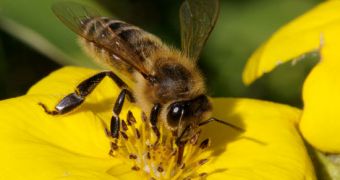An investigation carried out by scientists working with the University of Maryland and the US Department of Agriculture has revealed that the pollen bees collect on a daily basis contains traces of pesticides and fungicides.
The researchers suspect that this contaminated pollen is to blame for the fact that, over the past few years, bees have been dying by the millions.
In a paper recently published in the scientific journal PLOS ONE, the scientists warn that, unless measures to keep pesticides and fungicides off pollen are implemented as soon as possible, the bee population will drop to a considerable extent.
Since bees act as natural pollinators, this phenomenon will have a devastating impact on agricultural practices worldwide.
“Honey bees, Apis mellifera, are one of the most important pollinators of agricultural crops.”
“Recent declines in honey bee populations in many North American and European countries and increasing cultivation of crops that require insects for pollination raise concerns about pollinator shortages,” the researchers argue.
According to Inhabitat, the scientists have determined that contaminated pollen is to blame for the reported decline in bee population after analyzing pollen samples collected on the US east coast.
This pollen came from cranberry, watermelon and other types of crops, and contained traces of nine different pesticides and fungicides.
Tests carried out later on have revealed that bees exposed to these harmful chemical compounds have trouble fighting off a parasite dubbed Nosema ceranae, and that this sooner or later leads to their death.
News of this threat to the global bee population comes shortly after the EU has banned the use of certain pesticides proved to harm these insects. Since fungicides appear to also affect bees, the researchers warn that the problem is far more complex and that stricter measures are needed.
“It’s a lot more complicated than just one product, which means of course the solution does not lie in just banning one class of product,” study leader Dennis van Engelsdorp argues.

 14 DAY TRIAL //
14 DAY TRIAL //